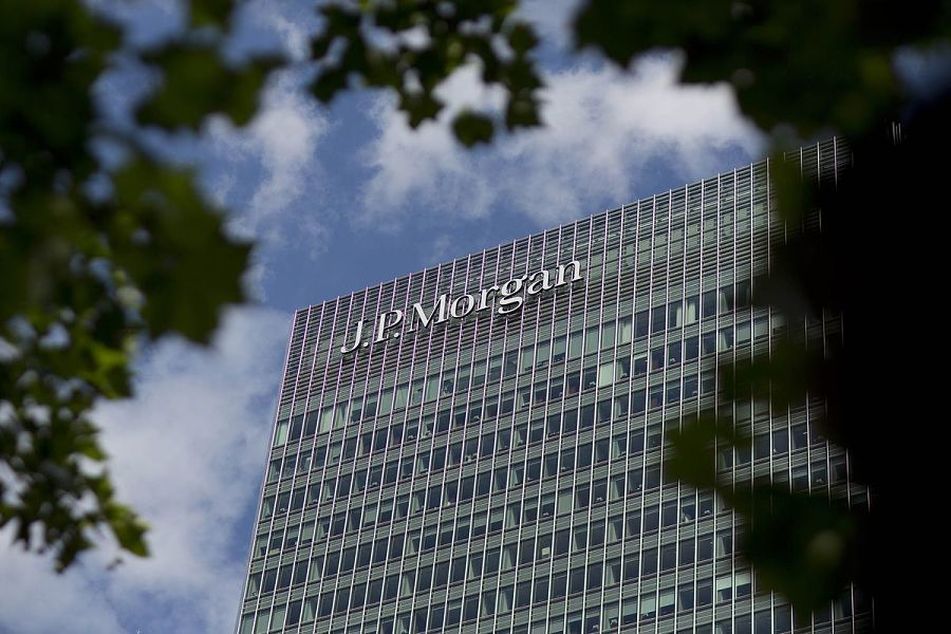JPMorgan pays $75M to settle US Virgin Islands suit over Epstein ties

The firm also reached a confidential agreement with former executive Jes Staley.
JPMorgan Chase & Co. reached settlements with former executive Jes Staley and the U.S. Virgin Islands over ties to Jeffrey Epstein, as it seeks to end its legal woes over its banking relationship to the deceased pedophile.
The biggest U.S. bank tentatively agreed to pay $75 million to the U.S. Virgin Islands, according to a statement Tuesday — less than half of the $190 million the territory had sought. JPMorgan also reached a confidential agreement with Staley to resolve the firm’s claims against him.
“JPMorgan Chase believes this settlement is in the best interest of all parties,” JPMorgan said in the statement. “While the settlement does not involve admissions of liability, the firm deeply regrets any association with this man, and would never have continued doing business with him if it believed he was using the bank in any way to commit his heinous crimes.”
Attorneys for Staley did not immediately respond to a request for comment.
The settlements cap nearly a year of public battles over JPMorgan’s ties to Epstein, which had become a reputational headache for the bank. A Jane Doe victim filed a proposed class action against JPMorgan in November, which it agreed to settle for $290 million in June.
The tentative deal announced Tuesday includes $30 million for U.S. Virgin Islands human trafficking charities and a mental health fund for Epstein survivors, $25 million to enhance local infrastructure and law enforcement to prevent sex crimes, and $20 million in attorneys’ fees.
“This settlement is an historic victory for survivors and for state enforcement, and it should sound the alarm on Wall Street about banks’ responsibilities under the law to detect and prevent human trafficking,” U.S. Virgin Islands Attorney General Ariel Smith said in a statement on Tuesday. The case also marked the first time a state attorney general had filed a sex-trafficking lawsuit, the U.S. Virgin Islands said.
Shares of JPMorgan fell around 1% to $144.79 in late morning trading.
The U.S. Virgin Islands filed the suit in December, and weeks later began detailing the contents of some 1,200 emails exchanged between Epstein and Staley, JPMorgan’s one-time private banking chief, over about a decade. The messages detailed the depth of the relationship between the two men, including exchanges about women, dinners at Epstein’s Manhattan townhouse and networking with world leaders.
In March, JPMorgan took the dramatic step of suing Staley, seeking to hold him liable for damages it incurred over its Epstein ties. Staley was Epstein’s main contact at JPMorgan, and in addition to the professional connection — Epstein introduced Staley to global and business leaders — their relationship was personal. In one email to Epstein, Staley referred to their friendship as “profound.”
But the U.S. Virgin Islands had argued the case was about institutional responsibility, not the actions of one banker.
U.S. District Judge Jed Rakoff was due by the end of the month to make a decision on requests filed by both sides that he resolve claims without a trial, known as summary judgment. The case was scheduled to go to trial in October. Rakoff must approve the settlements.
Deutsche Bank agreed in May to pay $75 million to Epstein victims who accused the German bank of facilitating the financier’s sex-trafficking operation. Epstein moved his accounts to Deutsche Bank after JPMorgan cut ties with him, until 2018.
The cases led to the depositions of former and current bank executives, including Chief Executive Jamie Dimon. Subpoenas were also sent to a roll call of American billionaires, including Google co-founder Sergey Brin. The U.S. Virgin Islands said Epstein may have introduced Brin to JPMorgan.
The bank had taken a harder line in its litigation with the U.S. Virgin Islands that it did with Doe, accusing the territory of hypocrisy in failing to investigate Epstein’s crimes sooner.
For its part, JPMorgan seized on emails between former Epstein staffers in the U.S. Virgin Islands and local government officials to point to the late pedophile’s influence there when he was alive. Epstein paid for school and college tuition for the children of the former governor, whose wife worked for him and allegedly acted as his conduit to other figures in the Virgin Islands government. Former U.S. Virgin Islands First Lady Cecile de Jongh and other officials tried to soften sex offender monitoring laws to benefit Epstein and also helped him get $300 million in tax breaks, court documents revealed over the past few months.
In the wake of Epstein’s death by suicide awaiting trial on sex-trafficking charges in 2019, the U.S. Virgin Islands sued and eventually reached a $105 million settlement with his estate. Earlier this year, the territory struck a $62.5 million deal with Apollo Global Management co-founder Leon Black to avoid a public legal battle over his past Epstein ties.
Black was once an Epstein client and paid him $158 million for financial advisory services, but Black has denied knowing of Epstein’s illegal conduct.
The case is USVI v. JPMorgan Chase Bank, 22-cv-10904-UA, US District Court, Southern District of New York (Manhattan).
Struggling big-cap tech stocks, rising rates will weigh on S&P, says Morgan Stanley strategist
Learn more about reprints and licensing for this article.








